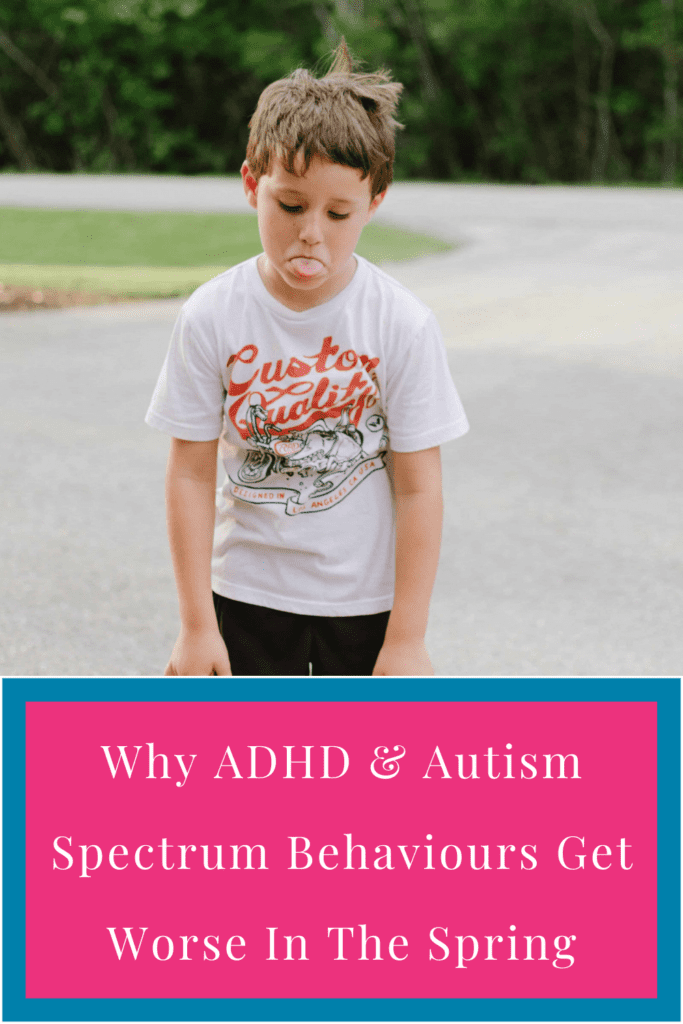It happens every spring. Parents tell me their child was doing okay then all of a sudden the school is calling about behavior; their child’s focus has gone down the drain, they’re more irritable and there is even increased aggression, moodiness and problems with impulsivity, tics, OCD and sensory meltdowns.
No you’re not crazy! And you’re not doing something wrong.
The connection between spring and the worsening of behaviour is actually nothing new. It has been documented and researched for decades. Prescription medications for everything from Ritalin to anti-anxiety to antidepressants increase in the spring. The highest suicide rate is in spring. As someone who is anxiety prone, I’ve noticed my own anxiety has the potential to flare in the spring if I don’t stay on top of it. Only recently did I learn the reason why.
So if I have piqued your curiosity and you’re on the edge of your seat wondering why your kid drives you crazy every spring–it’s histamine.
Oh I know you’re thinking–but Lorraine, my child doesn’t have seasonal allergies.
Oh really? Just hold up.
Let me ask you this…
During spring or even Fall does your child have an increase or sudden onset of the following behaviours or symptoms?
- Hyperactivity/Aggression
- More irritable or emotional
- Poor self-regulation, less focus and/or concentration
- Anxiety or insomnia
- Onset or increase of tics, stimming etc.
- Bed wetting
- Sensory sensitivities (clothes uncomfortable, or sensory seeking behaviour)
- Sudden outbursts like yelling/crying
- Touching genitals (common in autism spectrum children). This is because among its many roles histamine is what makes animals so darn ‘flirtatious’ in the spring. High histamine increases blood flow–everywhere.
The most common signs that I hear from parents however, is an increase or sudden onset in impulsivity, restlessness, irritability, violent behaviour and even rage.
Research on the connection between histamine and worsening of behavior in the spring among children on the spectrum found these children often have higher than normal histamine levels compared to neuro-typical children. Only half of those children actually had the typical allergic response like sneezing, itchy eyes, stuffy nose, headaches etc.
I knew with my own experience with my daughter’s neuro-immune illness, PANS, that every spring was an unimaginable nightmare. For years, I couldn’t figure out why, until I learned that histamine played a huge role. For years, I hadn’t made the connection and when I did realise something was up spring, I couldn’t figure out what that was until I learned that histamine plays a huge role on our brain chemistry.
While it might seem that histamines are just there to torture us–they are essential bio-chemcials and neurotransmitters that are present in the mast cells or immune cells. H3, a type of histamine that acts on the nerve cells and brain, is a neurotransmitter and elevated levels are connected to OCD, anxiety and ADHD and insomnia.
Histamine actually influences our ability to learn, memorize, be wakeful, pay attention, regulate temperature and appetite, as well as affect sleep, mood, sex drive–auto-immunity as well as many other countless functions. It’s all about too much or too little. Since histamine in the brain is focused on the central nervous system, you can see why your kids might get crazy in the spring!
You can test this very simply. If your child’s behaviour improves after taking an anti-histamine for a few days then that’s a clue that histamine might be a culprit. If this sounds far-fetched consider this–antihistamines have been used for quite some time now to treat anxiety.
When histamine is high there is often an increase in hyperactivity, compulsions, anxiety and even depression. However, if it gets too low then paranoia, tinnitus, fatigue, irritability and again depression can result.
High histamine can also get really troublesome because it makes the blood-brain barrier more permeable making it easier for toxins like chemicals and heavy metals to more easily enter the brain.
This is also why food allergies and sensitivities are so important to address. Notice if your child’s behaviour changes within a couple of hours of eating a particular food. I had a client who wasn’t anaphylactic to peanuts, but became a Tasmanian devil within a few hours of going anywhere near peanuts.


